The Brooklyn Academy of Music presents Mark Morris: Two Operas, March 15 through 19.
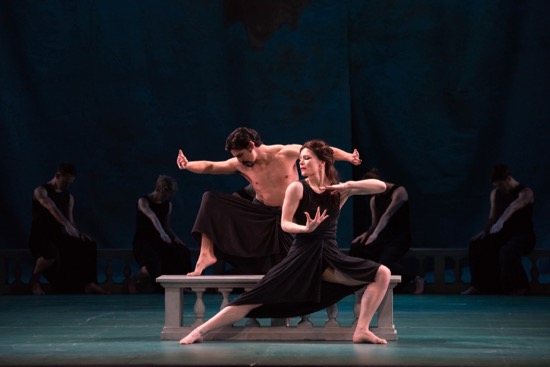
Guillermo Estrada, Jr. and Laurel Lynch as the hero and heroine of Mark Morris’s production of Henry Purcell’s Dido and Aeneas. Photo: Nan Melville.
On the last day of July, 2013, I saw and heard an unforgettable performance in Tanglewood’s Seiji Ozawa Hall. Mark Morris had directed Benjamin Britten’s Curlew River for a cast of Tanglewood Fellows and paired it with his 1989 visualization of Henry Purcell’s opera Dido and Aeneas, performed by the Mark Morris Dance Group and the MMDG Musical Ensemble. The last sentence of my review was this: “I wish I could see it again this very minute.”
I’ve had to wait three-and-half years.
An hour from the moment I am writing the above words, the double feature billed as “Mark Morris: Two Operas” and subtitled “An Evening of Britten and Purcell” will begin its last of four performances on the stage of the BAM Howard Gilman Opera House, where I saw it on the opening night.
How long before I can see it again?
I’m as fascinated by what these two short operas have in common as I am by their obvious differences. Given the centuries in which they thrived, Henry Purcell (1659-1695) and Benjamin Britten (1913-1976) would have led very dissimilar lives, yet Britten evidently admired Purcell greatly, creating “realizations” of a number of the composer’s works, basing the variations in The Young Person’s Guide to the Orchestra on a theme of Purcell’s, and editing a version of Dido and Aeneas.
The plots of both operas are anchored by journeys, and both involve supernatural intervention. The text of Curlew River was adapted by William Plomer from Sumidagawa, a Noh drama that had profoundly struck Britten and his companion, singer Peter Pears, when they saw it in Japan. It tells of a well-born widow, who has gone mad while wandering in search of her son, abducted at the age of twelve. Voyaging across a river on a ferry, she discovers that the ceremony in progress on the other side honors the son she seeks, whose spirit, it is believed, has healing powers; brutalized by the man who had enslaved him and then abandoned him when he was too weak to continue, he had died on that spot a year ago.
Nahum Tate created the libretto for Purcell’s Dido and Aeneas, drawing on Virgil’s Aeneid. Fleeing Troy, before its defeat by the Greeks, Aeneas has been wandering ever since. Although the gods have told him his destiny lies in Italy, he and his sailors are loath to leave hospitable Carthage, and its beautiful queen, Dido, has fallen in love with him. A sorceress who can’t bear the thought of human happiness conjures up a storm and a faked message from Mercury telling Aeneas he must set sail for Italy. Proud Dido, hurt and angry at his compliance, tells him, “To your promis’d empire fly,/ And let forsaken Dido die.” No offer to stay on his part appeases her. He goes. In Virgil’s telling, she kills herself; Purcell has her simply die of grief.
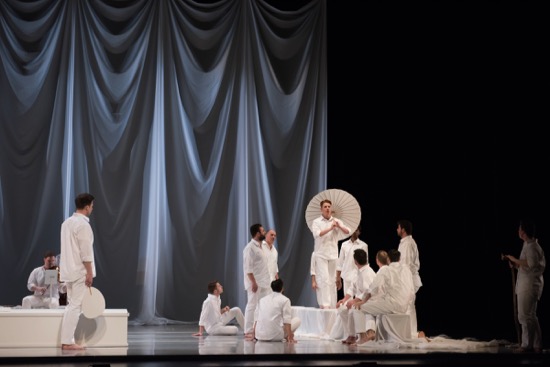
Benjamin Britten’s Curlew River, directed by Mark Morris. Isaiah Bell with parasol among monks/pilgrims. Far left: Douglas Williams; far right: Conor McDonald; visible at back: violist Greg Luce. Photo: Nan Melville
Allen Moyers’ set for Curlew River is all white, except for the grayish platform that stands for the ferry boat; a bench draped in white cloth for the musicians to sit on, a longer one along the side of the stage for the eight men of the Chorus. The thirteen singers and seven musicians all wear white pants and open-collared white shirts. As in Noh dramas, the singer-actors are men. The opera’s subtitle is “A Parable for Church Performance,” and Britten and Plomer, in Christianizing the text, have made the kernel of the story into a mystery play that an abbot and his monks are performing.
Dido and Aeneas features twelve onstage performers, and in it gender distinctions are also diffused. With the single exception of Aeneas, who appears bare-chested, the dancers—men and women alike—are costumed by Christine Van Loon in sleeveless black garments with long draped skirts. All wear earrings and very red lipstick. In Robert Bordo’s design, the bench that stretches across the back of the stage is black as well (or very dark grey, although the pillared one that replaces Curlew River’s ferry boat downstage center is a shade paler.
Musically, Curlew River is spare, with some haunting layering of its instruments. The musicians are Greg Luce (viola), Logan Cole (double bass), Alex Sopp (flute/piccolo), Michael Atkinson (horn), Adam Phan (harp), MMDG Music Ensemble director Colin Fowler (organ), and Chris Thompson (percussion). There is no conductor, although occasionally baritone Clinton Curtis, who plays both the medieval abbot who announces the performance and the leader of the pilgrims who have assembled at the dock, sets a tempo with a single gesture.
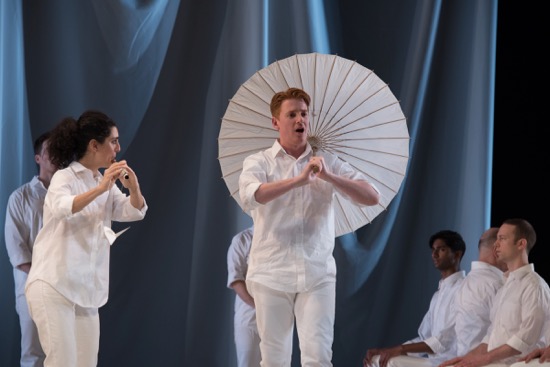
Benjamin Britten’s Curlew River, staged by Mark Morris. Isaiah Bell with parasol, Alex Sopp with piccolo. Identifiable at right: Michael Maliakel (L) and Andrew Fuchs. Photo: Nan Melville
Morris has provided what he termed in an interview “Japanese symptoms.” Upon entering, the performers all step out of white rubber zoris. When seated on or alongside the bench, the men fold white sheets of paper into what turn out to be little origami boats or birds. Isaiah Bell, as the Madwoman carries a paper parasol. But, although he can hide shyly behind it, or angle it like a lady, he also several times opens and closes it rhythmically, as if it were a pulsing heart.
The chorus (Andrew Fuchs, Cooper Grodin, Dominic Inferrera, Chad Kranak, Tim Krol, Michael Maliakel, Edmund Milly, and Jason Weisinger) not only sings. The men are sometimes quite natural as they fold their papers or converse quietly or respond to what they see or hear. They also twice perform a simple dance with flowing gestures (Morris’s take on a bon odori or festival dance). And, in a number of ways, they create tides—stepping forward and then backward, advancing and retreating, creating ripples like the river that the pilgrims must cross. At least one musician also travels. As Bell takes a long, symbolic trip around the stage, Sopp follows, accompanying him, circling him, as she plays her piccolo.
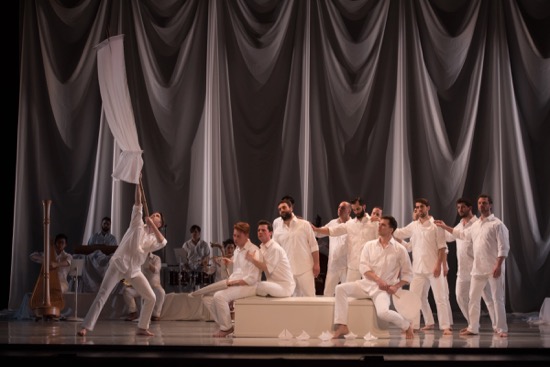
Benjamin Britten’s Curlew River, staged by Mark Morris. Wielding the sail: Daniel Moody. Sitting in the “boat” (L to R): Isaiah Bell, Conor McDonald, and Douglas Williams. Standing far R.: Clinton Curtis. Musicians at back front row): harpist Adam Phan, horn player Michael Atkinson (hidden), and flute/piccolo player Alex Sopp. Behind them: organist Colin Fowler, percussionist Chris Thompson. Photo: Nan Melville
There is much elaboration within simplicity. The Abbot presents the tale as an example of God’s grace bestowed upon a sufferer. The Ferryman (Douglas Williams) announces himself and tells of the celebration on the other side of the river. A traveler (Conor McDonald) who has a long journey ahead of him asks for a seat on the boat. The men of the Chorus, comment, repeat, and emphasize. These are all impressive singer-actors. Williams has a particularly rich and powerful baritone, and his lack of affectation or effort is remarkable. He can seem at ease in his body, while the resonant sung words pour out as if they were simple speech.
But just as Dido and the Sorceress are the heroine and villainess of Purcell’s opera, the Madwoman draws Britten’s tale together. Entreating the Ferryman for passage, she invokes the wild curlews of the Fenland whose cries lead her on. Bell, who also played the role in 2013, is an astonishing performer. It’s not just that he possesses a splendid tenor voice, but how he modulates it for this role. He can go from a fierce outburst into a tone so quiet and introspective that it falls into silence, and, like a Noh performer, he can draw out and fade a final syllable. His physical portrayal is elegantly refined—hinting at femininity and aristocratic manners, as well as the drifting consciousness of one in distress. Once in the “boat,” behind a sail that is wielded rhythmically on a pole by Daniel Moody, this tragic woman seems to sleep, leaning against the Traveller. It’s just one of Morris sensitive choices that when the travellers have landed and the boat is upended to indicate a tomb, the high, unseen voice that rings magically out is that of countertenor Moody. So the spirit of the dead child is also the spirit-wind that brings the mother—too late—to her son.
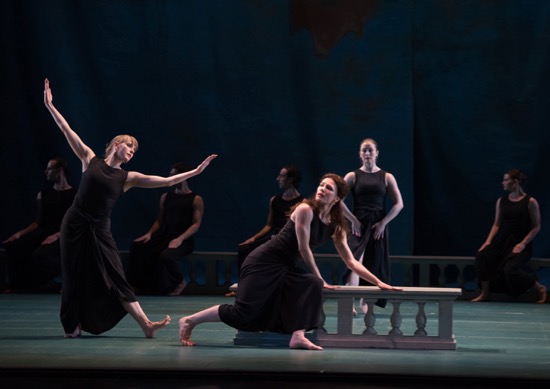
Laurel Lynch as Dido in Mark Morris’s Dido and Aeneas. With her (L) is Lesley Garrison as Belinda and Rita Donahue as the Second Woman. Photo: Nan Melville
After the quietude and intimations of nature in Britten’s music and the refinement of the performers, Dido and Aeneas arrives shimmering and bubbling. The five solo singers and sixteen members of the chorus, who were on a balcony high above the back of the stage in the Tanglewood performances, are now in the pit with the MMDG Music Ensemble, conducted by Morris. Prominent among the soloists is the magnificent mezzo-soprano Stephanie Blythe, who sings both as Dido and (a first for her) as the Sorceress. Williams stands beside her to sing Aeneas’s part. Sherezade Panthaki is the voice of Dido’s sister Belinda, and Yulia Van Doren voices a second woman attendant, and they also double as the first and second witches in scenes 2 and 4.
What we see, of course, is the embodiment of those voices, those words, those melodic excursions. Those who play “Courtiers, Witches, Spirits, Sailors, and Conscience” may sit on the bench at the back, stylishly angled, their hands on their thighs, ready to jump into action when Purcell calls. They are Sam Black, Rita Donahue, Lesley Garrison, Lauren Grant, Brian Lawson, Aaron Loux, Dallas McMurray, Nicole Sabella, Billy Smith, and Noah Vinson.
It is Garrison as Belinda and Donahue as the Second Woman who urge Laurel Lynch as Dido to consider Aeneas as a lover. They might be humming birds buzzing around her, as the corresponding singers happily tell her to “Fear no danger to ensue,/ The hero loves as well as you,” and the chorus temptingly backs that up. When Aeneas (Guillermo Estrada, Jr.) strides in, and the dancers wind around the two, they gesture as if grooming them, but don’t touch them. You get the impression that Dido (her fingernails jeweled) is engulfing him in some way. The lovers freeze while the courtiers dance triumphantly, sometimes contrapuntally, and Garrison and Donahue whisper on the sidelines. When Estrada and Lynch join the revels, it’s to advance, swaying their hips sinuously and suggestively, after which she leads him away. As in several subsequent scenes, the onstage ensemble ends this one by drumming their feet on the floor, before lighting designer James F. Ingalls provides a blackout.
Intensely musical, Morris has many ways of mingling words, musical rhythms, and texture. For instance, Scene 2, supposedly occurring in a cave (draped gray curtains succeed a crudely painted map), begins with a prelude. Before the Sorceress enters, to the words “Wayward sisters, you that fright/ The lonely traveller by night,” the witches have established night and solitary travellers by wandering around in apparent disorder, each one with a hand over his/her eyes. When, from the pit, Blythe calls out “Appear!” they’re already there collapsed.
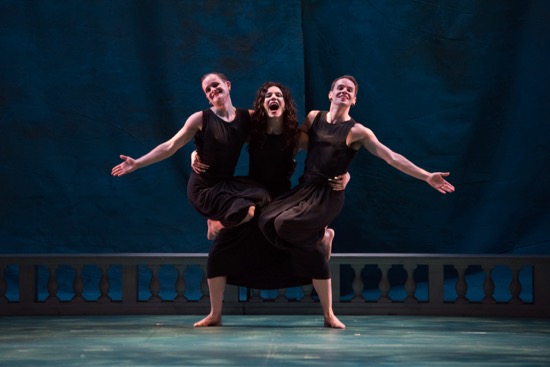
Laurel Lynch as the Sorceress reveling with witches Dallas McMurray (L) and Noah Vinson in Mark Morris’s production of Henry Purcell’s Dido and Aeneas. Photo: Nan Melville
It’s delightful to contemplate Morris’s bawdy witches, male and female, and imagine how they might have been portrayed in 1689, when they first appeared in Dido and Aeneas at the school for well-bred girls run by dancing master Josias Priest and his wife, presumably with some of those girls in the cast. Those little ladies may have enjoyed singing Purcell’s choruses of “ho, ho, ho,” but that would have been the extent of their lustful behavior. No waving their legs in the air the way Morris’s dancers do, or playing with their feet, or reaching down through their legs to scoop up something they could happily cram into their mouths. Lynch, having summoned her colleagues in evil, now finds their antics boring. She rouses herself, though, to roister with her favorite witches (Noah Vinson and Dallas McMurray), their manly forms a roguish contrast to the high, giddy voices of Panthaki and Van Doren.
The musical treat of this scene is the echo effect (perhaps because setting is a cave) of the last song and dance. The repeated lines —“In our deep vaulted cell,/ The charm we’ll prepare,/ Too dreadful a practice/ For this open air”—are broken up so that words strongly sung are repeated in quieter tones, and the dance that follows echoes that pattern. For thunder we get those drumming feet again.
The union of Aeneas and Dido is symbolized by a lying together and a single contraction on his part, although, in this hunting scene in a grove, Morris teases out allusions to lovemaking from such lines as Aeneas’s “Behold upon my bending spear. . . .” before an impending storm sends everyone scurrying away.
The juxtaposition of comedy and tragedy has a certain irony when set to this music, which, however, agitated, is always beautiful. Yet everything that Morris draws from it seems perfectly appropriate. After Aeneas has sadly received the false message that he must leave Carthage, the dancers turn into the sailors waiting in the port for orders. Yes, they pull on imaginary ropes, but Morris has taken to heart some these words of their leader: “Take a boozy short leave of your nymphs on the shore, /And silence their mourning/ With vows of returning,/ But never intending to visit them more.” There are no nymphs, but a lot of boozing and card-playing on the bench at the back, while that officious sailor exhorts them, and it’s one of Morris’s jokes that, while the singer in the pit is Jason Weisinger, his bold, lustily dancing equivalent is Lauren Grant, the smallest woman in the company; when the sailors rush offstage, one of the men tosses her over his shoulder into a fireman’s carry and totes her away.
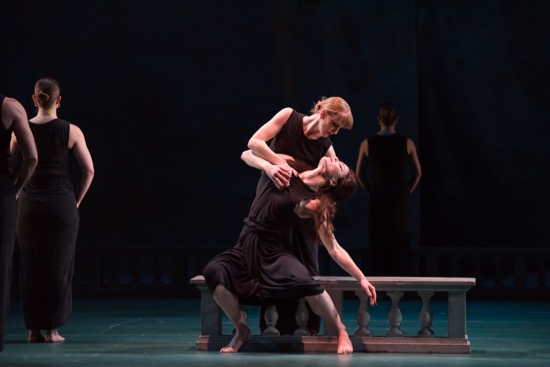
Lesley Garrison and the expiring Dido in Mark Morris’s production of Henry Purcell’s Dido and Aeneas. Photo: Nan Melville
The sailors immediately return as witches to recount their delight at the sight of the ship sailing and the storm they’ll conjure up: “From the ruin of others our pleasures we borrow; Elissa bleeds tonight and Carthage flames tomorrow” (Elissa meaning Dido). But the last scene between Dido and Aeneas is grave, a matter of gestures and positions that suggest his changes of heart and her resoluteness. “No!” She strikes a fist against her palm. “Great minds against themselves conspire,” sings the chorus, “And shun the cure they most desire.”
The ending is poignantly staged. While Blythe sings Dido’s great last aria to her sister, “When I am laid in earth, may my wrongs create/ No trouble in thy breast,/ Remember me! But ah! Forget my fate,” Garrison as Belinda copies Lynch’s wilting gestures off to the side. After Lynch has collapsed over the smaller platform, all the others turn their backs to the audience and, as the chorus sings and the final instrumental dance plays, they walk slowly, two by two, toward a high rear platform in such a way that they ascend its stairs and disappear, each now alone, through a central gap in the curtains. Donahue, the last one to go, pauses and looks back at the sisters. Garrison makes a simple gesture that says, “No, you go. I’ll stay with her.” And that’s it.
The dancers adjust marvelously to the changes from love and light to darkness and hate, from noble courtesy to bawdy excess, from a journey toward a new land to a journey into death. Estrada is eloquent as Aeneas, and Lynch’s performance as Dido and the Sorceress has grown even richer since 2013. Perhaps, too, Blythe’s marvelous voice inspires her. Now a statuesque beauty who is ready for love, now a vulgar and vengeful hag, Lynch inhabits both roles (originally played by Morris himself) fully and imaginatively.
Purcell was thirty years old when Dido and Aeneas was first presented. He was only about six years older and at the peak of his career when he died. In those years, death could come early, and everyone lived knowing that. His will ended with these words: “In the name of God Amen. I, Henry Purcell, of the City of Westminster, gentleman, being dangerously ill as to the constitution of my body, but in good and perfect mind and memory (thanks be to God) do by these presents publish and declare this to be my last Will and Testament.” A good and perfect mind indeed and a splendid inheritance.

This is terrific. And not only did Purcell speak across the centuries to Britten, his countryman, he also speaks to Morris, born in a very different place. I saw Morris’s “King Arthur” in London, where it premiered and while it is a slighter work than “Dido and Aeneas” I truly loved it.
You certainly make me want, badly, to see Curlew River. Many thanks.
I’m envious that you’ve gotten to see this double bill again–I also saw the Tanglewood performance & found the two operas sublime. I’ve only seen Morris’s performance in Dido on video, so it’s unfair to compare it to seeing Lynch perform the double role live, but I prefer Lynch: maybe it’s my own gender-bound limitations, but as wonderful as it was, there was always something about Morris in the roles that smacked of drag performance (though he would vehemently deny this), and Lynch brought the opera a new erotic charge, made all the more moving by the baroque orderliness of so much of Purcell’s score. Curlew is altogether extraordinary–a moving work brilliantly choreographed for non-dancers, with the most minimal of gestures looming very large. Thank you Deborah, for bringing this alive.